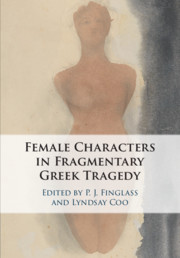Book contents
- Female Characters in Fragmentary Greek Tragedy
- Female Characters in Fragmentary Greek Tragedy
- Copyright page
- Contents
- Notes on Contributors
- Preface
- Abbreviations
- 1 Introduction
- Part I Themes
- Part II Plays
- 7 Dancing on the Plain of the Sea
- 8 Europa Revisited
- 9 When Mothers Turn Bad
- 10 The Music One Desires
- 11 Fragmented Self and Fragmented Responsibility
- 12 Female Agency in Euripides’ Hypsipyle
- 13 Making Medea Medea
- Bibliography
- General Index
- Index of main female characters discussed
8 - Europa Revisited
An Experiment in Characterisation
from Part II - Plays
Published online by Cambridge University Press: 11 June 2020
- Female Characters in Fragmentary Greek Tragedy
- Female Characters in Fragmentary Greek Tragedy
- Copyright page
- Contents
- Notes on Contributors
- Preface
- Abbreviations
- 1 Introduction
- Part I Themes
- Part II Plays
- 7 Dancing on the Plain of the Sea
- 8 Europa Revisited
- 9 When Mothers Turn Bad
- 10 The Music One Desires
- 11 Fragmented Self and Fragmented Responsibility
- 12 Female Agency in Euripides’ Hypsipyle
- 13 Making Medea Medea
- Bibliography
- General Index
- Index of main female characters discussed
Summary
This chapter addresses the extensive fragment attributed to Aeschylus’ Carians/Europa, in which the speaker Europa describes her rape by Zeus, the births of her three children, and her fear for the safety of her son Sarpedon; this speech allows the audience ‘to contemplate the sufferings of Europa over a woman’s full lifecycle, culminating in her role as aged mother awaiting her only surviving son’s return’. Considering issues of lexicon and dramatic technique, the chapter supports a date for the play in the 420s, noting with sympathy Martin West’s argument this play’s author was Aeschylus’ son Euphorion.
- Type
- Chapter
- Information
- Female Characters in Fragmentary Greek Tragedy , pp. 125 - 138Publisher: Cambridge University PressPrint publication year: 2020

